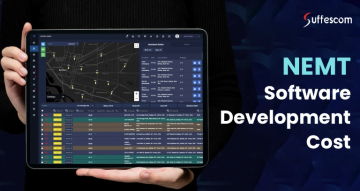How Much Does Software Development Cost in UK – Full Buyer's Guide

Key takeaways:
- The UK software market is projected to reach $48.3 billion by 2029, and this rising demand is directly pushing software development costs anywhere from £15,000 to £80,000+.
- Location impacts pricing significantly, with London being 15–30% more expensive than regional cities due to higher senior engineering salaries.
- AI, cloud-native architecture, and strict UK/EU compliance standards now form baseline expectations and can increase development budgets by 20–40%.
- Accurate budgeting requires the right delivery model, and most businesses allocate 10–20% yearly for maintenance to ensure long-term stability.
In the UK's competitive digital landscape, software development costs are changing rapidly as more businesses enter the market. According to a report from Statista, it is revealed that the software market in UK is anticipated to cross a valuation of $48.37 bn by 2030, and another report suggests that senior engineers and AI developers have grown more than two times in place of general tech roles, creating an upward pressure on development cost in UK.
Moreover, organisations planning to develop new software or modernise existing ones must now estimate costs using a data-driven approach. AI integrations, strong architecture, and more have become the baseline expectations, and all such aspects influence the total software development cost in UK. Generally, the price ranges between £15,000 - £80,000 based on requirements.
In this blog, we will discuss the key factors that influence the development cost for 2026. It provides a clearer understanding of how to calculate UK software development costs.
Understanding Software Development Costs in UK
Software development cost UK is impacted by a lot of aspects like regional differences and compliance requirements. For 2026 and beyond, these aspects have become more pronounced and shape the project budgets.
- The project development cost differs across the UK because London is the costliest due to senior talent rates, and Manchester and Birmingham provide similar projects on mid-scale builds.
- Talent inflation continues to increase development costs as demand for AI grows, and AI developers are charging 30–40% more than traditional full-stack roles.
- Compliance frameworks increase the costs as they add extra architecture and audit, especially for industries like healthcare and fintech.
- Modern software now requires multi-region cloud setups, RBAC, and audit logs components, which were once optional but are now essential, increasing planning depth and engineering time.
To explore further, let’s examine the factors affecting the software development cost in UK in detail.
The Top 10 Factors Affecting Software Development Cost in UK
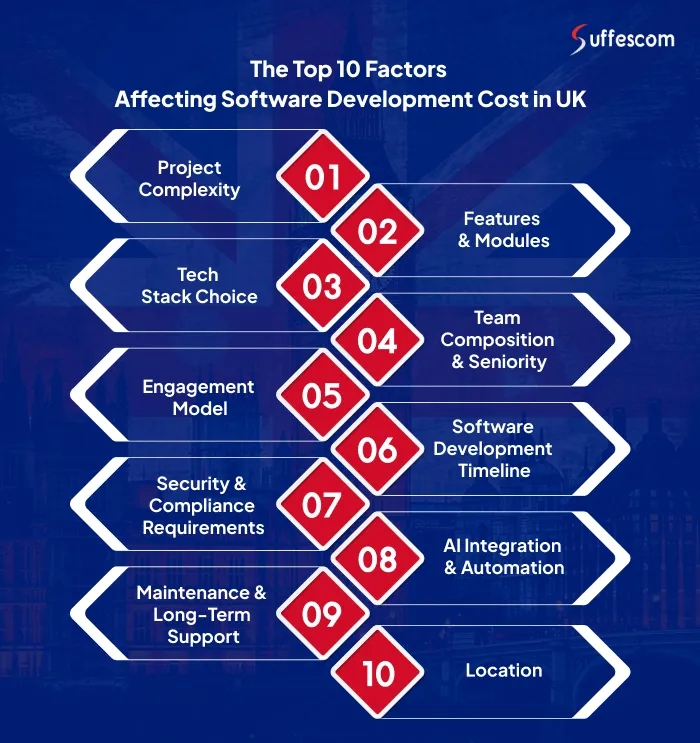
The cost to develop software in UK is shaped by a combination of different factors. Knowing these aspects in depth helps businesses accurately estimate expenses for software development services.
1. Project Complexity
The complexity of the software is the single strongest cost determinant. Basic workflow tools are easy to create and test, while multi-module software platforms with automation and AI require more planning and hours. This software project's complexity also affects team size and resources needed.
For instance, an internal booking tool in a software with two user roles might require 250-400 hours, but a complete logistics software with a route engine might exceed 1500 hours, which directly impacts bespoke software development UK cost.
Software Project Complexity Table
| Complexity Level | Typical Hours | Cost Range | Example Use Case |
| Low | 200–400 hrs | £15,000–£30,000 | Internal tools, admin dashboards |
| Medium | 600–1,200 hrs | £30,000–£50,000 | SaaS apps, mobile apps, CRMs |
| High | 1,500+ hrs | £50,000–£80,000+ | Logistics, finance, AI-driven systems |
2. Features & Modules
Each and every feature in a software solution increases the scope and adds new design, development, and more. Moreover, features like multi-role systems and payment workflows also create dependencies, which increase complexity and cost.
For example, adding payments or subscription billing can add £8,000–£25,000, depending on the provider and compliance rules.
Cost based on Features
| Feature Category | Included Features | Estimated Cost |
| Basic Features | Authentication, user profiles | £5,000 – £8,000 |
| Mid-Level Features | Dashboards, notifications, CMS | £8,000 – £12,000 |
| Advanced Features | Payments, geolocation, workflow automation | £12,000 – £20,000 |
| Premium Features | Real-time sync, AI models, video streaming | £20,000 – £28,000+ |
3. Tech Stack Choice
Different technologies need different skill levels. AI and cloud-native microservices require specialised talent, which impacts the software development cost in UK 2026.
For instance, a standard web app may use React + Node.js, while an AI-based software may require Python, LangChain, LLM orchestration, and vector databases, adding both costs and skills.
Cost Impact Based on Tech Stack
| Technology | Cost Impact |
| Web (React, Node.js) | Medium |
| Mobile (iOS, Android) | Medium–High |
| Cloud-native (AWS, Azure, GCP) | High |
| AI/LLM (RAG, CV, NLP) | Very High |
| Blockchain | Very High |
4. Team Composition & Seniority
A project’s cost depends on the seniority mix. When planning a custom software project in the UK, it’s important to know the financial implications of different developers. The UK has some of the highest senior engineering wages in Europe, especially in London.
Junior developers are usually less experienced and are best suited for basic tasks without any advanced decision-making. They are best for routine development enhancements and are an affordable option.
Mid-level developers come with more experience, often requiring more critical aspects in development. They are more expensive than junior developers, but more reliable.
Senior developers come with the highest level of expertise and cost the most. They can handle complex tasks and have leadership capabilities.
For example, a London-based senior engineer can take more than £110/hr, whereas a mid-level developer in Birmingham may be around £60/hr.
Developer’s Average Cost Estimate
| Role Tier | Hourly Rate | Skill Depth | Best Fit For |
| Junior | $20 – $50 | Low | Basic assignments |
| Mid-Level | $40 – $80 | Moderate | Mid-range builds |
| Senior | $80 – $150 | High | Complex systems |
5. Engagement Model
The pricing also depends on how the project is contracted. If you select a fixed-price model, which suits clear scopes, while time-and-material-based models are best for changing requirements. Moreover, desiccated teams offer long-term results.
For instance, a fixed-price MVP might cost £20,000, while the same software project on an hourly basis can range between £15,000–£25,000 because of the scope changes.
6. Software Development Timeline
The timeline of a software project also influences the cost because quick deliveries require more developers, longer working hours, and parallel development tracks, which all in turn increase costs, whereas a project with a flexible timeline might cost a little less. Speed premiums are very common in UK for large and enterprise-level projects.
For instance, compressing a 6-month software development UK process into 3 months might incur a 15-20% cost.
7. Security & Compliance Requirements
UK businesses working in finance, healthcare, and government face heavy compliance obligations. This requires more architecture work, penetration testing, encryption design, and documentation that increase the overall software development cost in the UK in 2026.
For instance, a healthcare application aligned with NHS Digital and GDPR can add £5,000–£15,000 in compliance-related tasks.
Compliance Requirement vs Cost Impact
| Compliance Type | Cost (Estimated) |
| Basic GDPR | £3,000 – £8,000 |
| Cyber Essentials | £6,000 – £12,000 |
| NHS Digital | £15,000 – £30,000 |
| FCA / PSD2 | £20,000 – £40,000 |
8. AI Integration & Automation
AI integration services and automation increase the cost to build software in UK because of different vector databases, model evaluation, training, and expert engineering, but they decrease the long-term operational expenses.
For example, a RAG-based AI chatbot integrated in a software solution can add £8,000–£12,000 based on the custom workflows.
| AI Feature | Cost (Estimated) | Technical Requirements |
| Chatbot (Basic NLP) | £8,000 – £15,000 | Standard API-based implementation |
| RAG Search | £18,000 – £35,000 | Requires vector DB and embeddings setup |
| Predictive Analytics | £20,000 – £40,000 | Includes data modelling and CI/CD pipelines |
| Computer Vision | £35,000 – £70,000+ | Needs GPU resources and extensive model training |
9. Maintenance & Long-Term Support
Software development costs in UK are also impacted by post-launch and maintenance services, which include cloud monitoring, bug fixes, and feature updates to make the software solution relevant for the future and ensure its stability.
For example, most UK businesses that want to develop a software solution allocate 10-20% of the initial build cost annually for maintenance.
10. Location
Regional cost is also a clear indicator of software development cost UK because each location differs based on salaries and operational requirements. Let’s explore the hourly costs based on the location across UK.
Hourly Cost Based on Location
| Cities | Hourly Rate Range | Market Position |
| London | £80–£150/hr | Highest-priced talent hub |
| Manchester | £60–£120/hr | Balanced mid-tier pricing |
| Birmingham | £55–£110/hr | Competitive and growing |
| Edinburgh | £50–£100/hr | Cost-efficient with strong engineering talent |
| Glasgow | £40–£90/hr | Affordable and reliable |
Additional Factors That Affect Software Development Cost in the UK
Here are some additional cost factors that you should consider as well while developing a software solution.
Tax/VAT on Projects
It is important to know that projects developed within the EU may include a value-added tax (VAT), which influences the overall software development costs in the UK. So, knowing the implications for tax budgeting is required for an accurate cost estimate.
Software Marketing
Custom software marketing is also a major cost influencer because effective marketing is important to reach the targeted audience and achieve high adoption rates, but it also increases the total cost. It includes expenses related to promotions, campaigns, and ASO.
Licensing
Custom software development UK requires licensed technologies and a budget for the same, which impacts the cost to build software in UK. Moreover, under the EU AI Act, there are some strict standards for AI development that affect the overall cost to develop software UK.
Software Development Cost Breakdown (Updated Estimates)
Software development cost in UK require a clear structure across each phase from planning to post-launch. Each stage requires different costs to the total budget. Let’s explore the cost based on each development phase.
Overall Cost Distribution
| Software Development Phase | Cost Share (Avg.) | Deliverables | Estimated Cost |
| Discovery & Planning | 10–15% | Requirements, workflows, and architecture planning | £5,000 – £8,000 |
| UI/UX Design | 10–20% | Wireframes, design system, customer journeys | £8,000 – £12,000 |
| Software Development | 40–50% | Feature engineering across modules | £15,000 – £45,000+ |
| QA & Testing | 15–20% | Manual and automated testing cycles | £12,000 – £20,000 |
| DevOps & Deployment | 5–10% | CI/CD, cloud configuration, environment setup | £5,000 – £10,000 |
| Maintenance (Post-Launch) | 10–20% yearly | Bug fixes, feature enhancements, theme updates | £5,000 – £15,000/year |
Now let’s discuss what costs you might require based on project size and its phases.
Cost by Project Size
Project size is one of the strongest predictors of final UK pricing. Let’s explore the cost sale for different project sizes and how each impacts the total cost for 2026.
Small-Scale Software Development Cost (MVP / Single Module)
Small-scale projects are usually MVP builds and focus on basic functionalities of workflows, features, and UI. It ranges between £17,000–£33,500.
Typical scope characteristics:
- Essential features only
- Basic admin panel
- Standard cloud environment
- Limited or no integrations
| Phases | Estimated Range | Output |
| Planning | £1,000–£2,000 | Entry-level scope |
| UI/UX Design | £2,000–£6,000 | Streamlined design |
| Software Development | £10,000–£15,000 | Core module engineering |
| QA & Testing | £3,000–£8,000 | Functional testing |
| Cloud Setup | £1,000–£2,500 | Basic deployment |
Also Read: MVP App Development Cost
Mid-Scale Software Development Cost (Full App + Dashboard)
Complex workflows and modules are involved in mid-scale builds, and they will need additional testing and maintenance. These software projects cost between 25000 and 50000.
Typical scope characteristics:
- Multiple user roles
- Admin dashboard
- Integrations (payments, notifications, analytics)
- Web or mobile ecosystem
| Phases | Estimated Range | Output |
| Planning | £3,000–£4,000 | Requirement gathering document |
| UI/UX Design | £4,000–£8,000 | Multi-screen design |
| Software Development | £12,000–£20,000 | Core features + integrations |
| QA (Manual + Automation) | £4,000–£10,000 | Cross-device and regression |
| DevOps | £2,000–£8,000 | CI/CD and environment setup |
Enterprise-Scale Software Development Cost (Complex, Multi-Module)
These are the most expensive software projects in terms of size, requiring large architecture and long workflows with multi-environment deployment. It usually comes within the range of £33,000–£60,000.
Typical scope characteristics:
- Modular architecture
- Multi-role systems
- High-volume data handling
- Complex integrations
- Security, compliance, and documentation
| Phases | Estimated Range | Output |
| Planning | £4,000–£5,000 | Requirement gathering, competitor analysis |
| UI/UX Design | £6,000–£10,000 | Enterprise-level flows |
| Software Development | £15,000–£25,000+ | Large, multi-disciplinary teams |
| QA (Automation Heavy) | £5,000–£12,000 | Scaling-focused testing |
| DevOps & Cloud Architecture | £3,000–£10,000 | Multi-region, high-availability |
Cost Based on Software Type (UK Market Estimates)
When you want to develop custom software, you also choose the industry it will be used in or its type. Accordingly, the prices of the software types are also different since software types have different functionalities.
Web App Development Cost in UK
The cost of web app development is between 8,000 and 20,000. It varies based on the workflow's complexity, depth of role management, and modules.
Cost is shaped by:
- Scope of user-facing features
- Admin and reporting requirements
- API connectivity and cloud setup
- Security and authentication layers
- Performance and scalability goals
Basic web apps stay at the lower end of the range, while multi-module platforms move toward higher budgets.
| Type | Estimated Cost (UK) | Estimated Cost (USD) |
| Basic Web App | £8,000 – £12,000 | $10,000 – $15,000 |
| Interactive Web App | £10,000 – £18,000 | $12,000 – $23,000 |
| E-commerce Web Platform | £12,000 – £20,000 | $15,000 – $25,000 |
| Custom Web Application | £15,000 – £20,000 | $18,000 – $25,000 |
| Progressive Web App (PWA) | £10,000 – £18,000 | $12,000 – $23,000 |
Mobile App Development Cost in UK
Mobile app development cost in UK falls between £10,000 - £50,000 and varies for a number of aspects like platform selection, backend engineering, and platform. Native app development increases cost and total effort, while hybrid app development might need additional optimisation.
Key cost influencers:
- iOS vs Android vs cross-platform
- Native or hybrid architecture
- UI animation and interaction complexity
- API development requirements
- Caching and device management
The more device-specific features involved, the more the cost of development and testing.
| Type | Estimated Cost (UK) | Estimated Cost (USD) |
| Utility Mobile App | £10,000 – £18,000 | $12,000 – $23,000 |
| Social Media App | £20,000 – £40,000 | $25,000 – $50,000 |
| E-commerce App | £15,000 – £35,000 | $18,000 – $45,000 |
| Game App | £15,000 – £45,000 | $18,000 – $55,000 |
| AR/VR Mobile App | £25,000 – £50,000 | $30,000 – $62,000 |
| Super App Development | £15,000 – £30,000 | $20,000 – $40,000 |
Also Read: How Much Mobile App Development Cost in UK?
Custom CRM/ERP Development Cost in the UK
The cost to develop a custom CRM and ERP solution ranges between £10,000 - £40,000. They require hierarchy-based user access and automation. CRM and ERP usually need deep integration with internal systems.
What drives cost:
- Number of internal departments covered
- Workflow automation depth
- Data volume and structure
- Reporting and analytics requirements
- Integration with HR, finance, ops, or inventory tools
Enterprise environments require detailed documentation and multi-phase delivery, which increases overall cost.
| Software Type | Estimated Cost (UK) | Estimated Cost (USD) |
| Custom CRM Software Development | £10,000 – £35,000 | $12,000 – $45,000 |
| Custom ERP Software Development | £15,000 – £40,000 | $18,000 – $50,000 |
| Performance Management System | £15,000 – £35,000 | $18,000 – $45,000 |
| Billing & Invoicing System | £10,000 – £25,000 | $12,000 – $32,000 |
| Order Management System | £12,000 – £30,000 | $15,000 – $38,000 |
| HRMS Software | £20,000 – £30,000 | $25,000 – $40,000 |
AI Software Development Cost in UK
AI-based software projects are developed with a high initial budget and might range between £15,000 – £70,000 due to model training, vector management, and a specialised team. If it's an LLM-enabled feature or predictive analytics, AI requires a strong infrastructure.
Key cost factors include:
- Type of AI functionality (NLP, CV, automation, RAG)
- Data preparation and cleansing
- Model selection, tuning, and evaluation
- Integration of vector databases or embeddings
- Hosting and computational requirements
As the UK moves deeper into AI adoption, this type of software continues to show strong upward pricing trends.
| Software Type | Estimated Cost (GBP) | Estimated Cost (USD) |
| AI Chatbot Development (NLP) | £15,000 – £30,000 | $18,000 – $38,000 |
| AI Predictive Analytics | £20,000 – £50,000 | $25,000 – $62,000 |
| AI Computer Vision System | £30,000 – £70,000 | $38,000 – $87,000 |
| RAG / LLM-Powered Solution | £25,000 – £65,000 | $30,000 – $82,000 |
| AI Automation Platform | £20,000 – £55,000 | $25,000 – $68,000 |
SaaS Product Development Cost in the UK
SaaS builds require a strong architectural foundation and range between £10,000 – £25,000. It requires functionalities like support for multi-tenancy and usage analytics. SaaS products demand long-term maintainability.
Cost rises depending on:
- Number of tenant types
- Subscription, invoicing, and billing logic
- Onboarding flows and multi-role permissions
- Advanced dashboards and usage analytics
- Microservices vs monolithic architecture
SaaS development also includes long-term optimisation and growth planning, which adds to overall project investment.
| Software Type | Estimated Cost (GBP) | Estimated Cost (USD) |
| Basic SaaS (MVP) | £10,000 – £20,000 | $12,000 – $25,000 |
| Multi-Tenant SaaS Platform | £18,000 – £28,000 | $22,000 – $35,000 |
Industry-Specific Software Development Costs
The software development cost UK varies across different industries because they involve compliance-intensive development and secure infrastructure. These sectors demand precise workflows and engineering that align with certification requirements.
Primary cost drivers include:
- Regulatory standards (GDPR, PSD2, NHS, FCA)
- Encryption and audit requirements
- Workflow depth unique to each sector
- API ecosystems tied to banking or government
- Higher volumes of QA and security testing
These categories typically sit at higher price points due to stricter security and documentation obligations.
Software Development Cost Estimate Based on Industries
| Software Type | Estimated Cost (GBP) | Estimated Cost (USD) |
| Construction Management Software Development Cost | £12,000 – £35,000 | $15,000 – $45,000 |
| Safety Compliance Software Development Cost | £15,000 – £35,000 | $18,000 – $45,000 |
| Manufacturing Inventory Software Development Cost | £20,000 – £40,000 | $25,000 – $50,000 |
| Automotive Supply Chain Software Development Cost | £25,000 – £40,000 | $30,000 – $50,000 |
| Hotel / Property Management Software Development Cost | £12,000 – £30,000 | $15,000 – $38,000 |
| General Automotive Software Development Cost | £30,000 – £55,000 | $38,000 – $70,000 |
| HMI (Human-Machine Interface) Software Development Cost | £30,000 – £60,000 | $38,000 – $75,000 |
| Data Analytics Platform Development Cost | £20,000 – £45,000 | $25,000 – $55,000 |
| Healthcare Software Development Cost | £25,000 – £80,000 | $32,000 – $100,000 |
| Fintech Software Development Cost | £30,000 – £40,000 | $38,000 – $52,000 |
| Retail Software Development Cost | £15,000 – £60,000 | $18,000 – $78,000 |
| eCommerce Software Development Cost | £20,000 – £45,000 | $25,000 – $59,000 |
| Educational Software Development Cost | £18,000 – £70,000 | $22,000 – $90,000 |
| Tourism Software Development Cost | £15,000 – £35,000 | $18,000 – $46,000 |
| Real Estate Software Development Cost | £20,000 – £65,000 | $25,000 – $85,000 |
| Logistic Software Development Cost | £25,000 – £50,000 | $32,000 – $66,000 |
| Project Management Software Development Cost | £25,000 – £70,000 | $32,000 – $90,000 |
| Accounting Software Development Cost | £20,000 – £65,000 | $25,000 – $85,000 |
| MarTech Software Development Cost | £30,000 – £60,000 | $38,000 – $78,000 |
Hidden & Often Ignored Software Development Costs
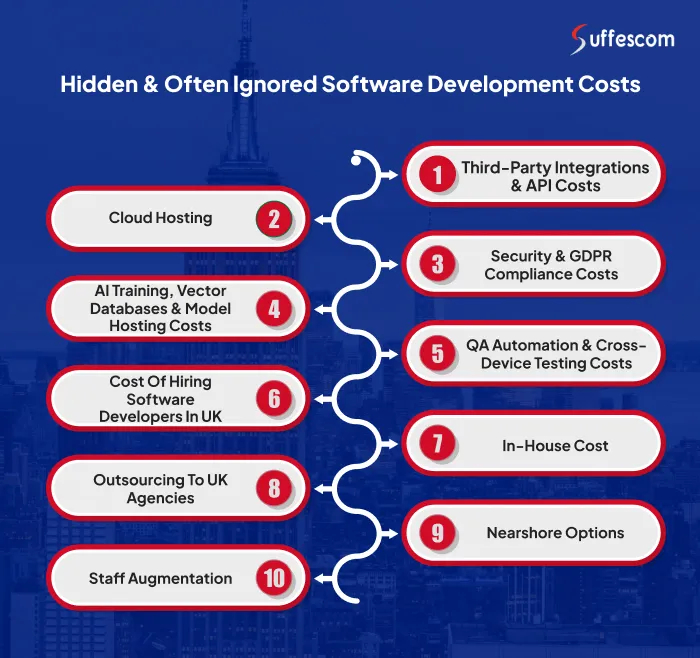
A lot of software development cost guides do not mention the critical components that impact budgets. These hidden costs cause scope creep and delays. Knowing about these initially helps make better plans and avoid budget overruns. Let’s discuss the main hidden cost aspects:
Third-Party Integrations & API Costs
Third-party API integrations introduce not only development effort but also recurring expenses. Each external service has its own pricing and technical requirements.
- A typical CRM or payment API may add £50–£300 per month, depending on usage tiers.
- When multiple APIs are involved, annual integration-related operating costs can exceed £5,000–£10,000.
These software development cost in the UK compound as the system grows and adoption increases.
Cloud Hosting
Cloud infrastructure in UK regions is priced higher due to data residency and compliance requirements. Costs scale with traffic and load.
- A standard UK-based cloud setup typically starts at £150–£300 per month, increasing to £1,000+ for applications that require auto-scaling.
- Log storage usage often accounts for 15–20% of overall cloud cost, but is rarely calculated upfront.
Ignoring cloud-side scaling costs is a big budgeting mistake businesses make.
Security & GDPR Compliance Costs
Security and compliance activities add quantifiable overhead to UK projects, especially in regulated sectors.
- A full penetration test generally ranges between £1,000–£3,000, depending on system size.
- GDPR documentation and data flow alignment typically require 20–40 hours of additional engineering.
These are mandatory layers for any business handling sensitive or personal information.
AI Training, Vector Databases & Model Hosting Costs
AI-enabled software solutions introduce new cost categories tied to compute power, data processing, and model operations.
- Vector database storage typically starts at £100–£300 per month, growing with document or embedding volume.
- Pipelines that handle large datasets may require £500–£2,000+ in monthly compute depending on usage patterns.
These costs scale proportionally with the size and activity of the AI environment.
QA Automation & Cross-Device Testing Costs
Quality assurance becomes more complex as platforms grow across multiple environments and devices.
- Setting up an automation framework often adds an initial £3,000–£8,000 but reduces regression testing costs later.
- Automation reduces manual testing hours by 30–50% in long-term development cycles, but only after the initial investment.
These testing layers ensure product reliability and stability, but are rarely included in the initial discussion of the software project budget.
Cost of Hiring Software Developers in UK
Hiring developers in the UK involves far more than basic hourly rates or salaries. For 2026, increased demand for AI, cloud, and cybersecurity skills has elevated hiring costs across the country.
In-House Cost
The in-house software development team UK carries the highest expense. Senior developers, on average, earn £80,000–£120,000 annually, which can cost a business more than £110,000–£150,000 once additional overheads are included. This type of hiring is best for businesses that need constant development capacity.
Outsourcing to UK Agencies
When outsourcing software projects to a software development company, they can charge high rates as they provide full delivery teams within one structure. These are best for projects that require predictable delivery and tight alignment with UK compliance. Outsourcing to an agency might cost more than 20-35% than nearshore partners.
Nearshore Options
Nearshore software development teams offer access to large talent pools at lower cost. This is a common cooperation model because operational overheads and salaries differ from the UK. This is ideal for businesses that want a software solution that leads while delegating engineering work to a lower-cost region without degrading the quality of software.
Staff Augmentation
Another way to develop your software is to hire developers and add to your in-house team to fill the expertise gap and increase capacity if required. This model is best for businesses wanting fast onboarding with no hiring commitments. Staff augmentation services are best for short-term and additional expertise.
Developer Hiring Rates Under Staff Augmentation
| Role | Hourly Rate |
| Hire dApp Developer | £22–£25 |
| Hire Ethereum Developer | £20–£25 |
| Hire Smart Contract Developer | £22–£25 |
| Hire Core Blockchain Developer | £23–£24 |
| Hire Swift Developer | £18–£21 |
| Hire Rust Developer | £22–£27 |
| Hire AI Developer | £28–£30 |
| Hire Kotlin Developer | £20–£23 |
| Hire Casino App Developer | £21–£25 |
| Hire Solidity Developer | £21–£25 |
| Hire Web3 Developer | £22–£26 |
| Hire MEAN Stack Developer | £21–£25 |
| Hire React.js Developer | £25–£30 |
| Hire NFT Developer | £25–£28 |
| Hire React Native Developer | £22–£24 |
| Hire Hybrid Blockchain Developer | £20–£24 |
| Hire Metaverse Developer | £15–£20 |
| Hire Crypto Exchange Developer | £27–£30 |
Software Development Cost Formula
The easiest way to calculate the custom software development cost UK is by using a simple formula. The formula is something like this:
Total Cost = Hourly Rate x Development Time
For instance, if you require 500 development hours and the hourly rate is £45, then the cost would be:
Estimated Cost = 500 x 45 = £22,500
Note: Keep in mind that this way of calculation only provides a general idea of the total development cost; it can always fluctuate based on the factors discussed above.
Real-World Cost Examples (UK Case Studies)
Transparent benchmarks that reflect what UK businesses typically invest when building different software solutions
Retail App Development
A London-based boutique chain needed a cross-platform shopping app with product catalogues, coupons, and click-and-collect. The build included UI/UX, API integration, and a basic admin panel, all completed within 10 weeks on a £30k budget.
Healthcare SaaS
A UK health-tech startup required a secure SaaS platform for appointment scheduling. The project included HIPAA/GDPR compliance and cloud deployment, resulting in a £85k full-cycle build.
AI Chatbot with RAG
A Midlands-based logistics provider deployed an AI support chatbot using Retrieval-Augmented Generation to answer shipment queries. Custom LLM tuning and vector DB setup brought the total to around £45k.
Enterprise ERP
A national manufacturing group commissioned a custom ERP covering inventory, IoT tracking, and multi-location access. The system required deep integrations and multi-phase deployment, exceeding £200k for a full enterprise roll-out.
Insurance Claims Automation Software
A large UK-based insurance company wanted a bespoke digital claims platform to simplify FNOL submissions, automate document checks, and manage assessor workflows. The build included OCR extraction, API integration, and secure role-based access, completed at around £120k.
How AI Is Changing Software Development Costs in UK
AI is changing software delivery economics across the UK, reducing effort in certain areas while increasing cost in specialised domains.
AI-Assisted Coding Reducing Hours by 25–40%
- AI-driven code suggestions accelerate development and minimise repetitive engineering cycles.
- Teams deliver core modules faster, reducing overall project hours in early feature development.
Automated QA & Deployment Saving 15–25%
- Automated test case generation lowers manual testing requirements and shortens regression cycles.
- AI-supported DevOps reduces deployment friction and lowers operational overhead over time.
Where AI Cannot Reduce Costs (Complex Architecture)
- Core architectural decisions still require senior engineers and cannot be automated effectively.
- Compliance-heavy systems and performance-sensitive modules maintain a higher cost regardless of AI adoption.
Cost-Saving Tips Without Compromising Software Quality
Smart planning and selective optimisation can reduce UK software development costs by 15–30% without lowering quality. Here are the main cost saving tips:
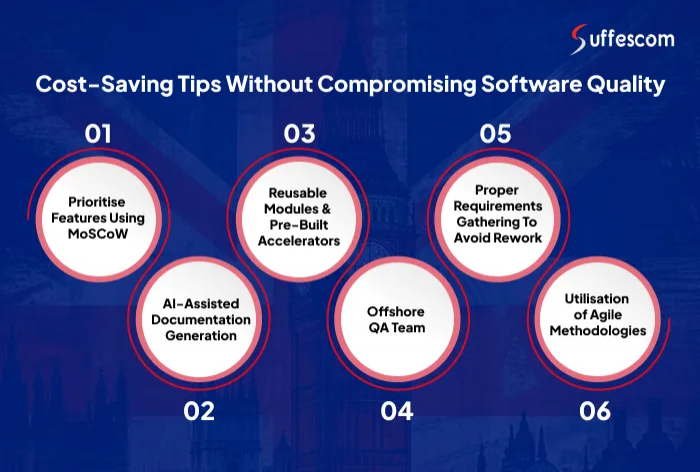
Prioritise Features Using MoSCoW
Focusing on features based on the MoSCoW (must have, should have, could have & won’t have) approach first can reduce initial build cost by 20–40% by eliminating low-impact scope from the first phase.
AI-Assisted Documentation Generation
Using AI to create user stories, requirement drafts, and flow diagrams can save 10–15% of early-stage planning time.
Reusable Modules & Pre-Built Accelerators
Leveraging existing components, open source tools, libraries, and UI kits can reduce engineering hours by 25–35% for common functionalities.
Offshore QA Team
Using offshore QA teams while keeping architecture and core engineering in the UK can lower quality assurance expenditure by 30–50%.
Proper Requirements Gathering to Avoid Rework
Clear requirements reduce costly rework cycles, which typically account for 8–12% of total project spend in poorly scoped projects.
Utilisation of Agile Methodologies
Agile development methodologies will help teams in an iterative approach, which allows quick project changes. Tools like Jira and Trello implement agile practices by simplifying sprint planning.
Revenue Models for Custom Software Development
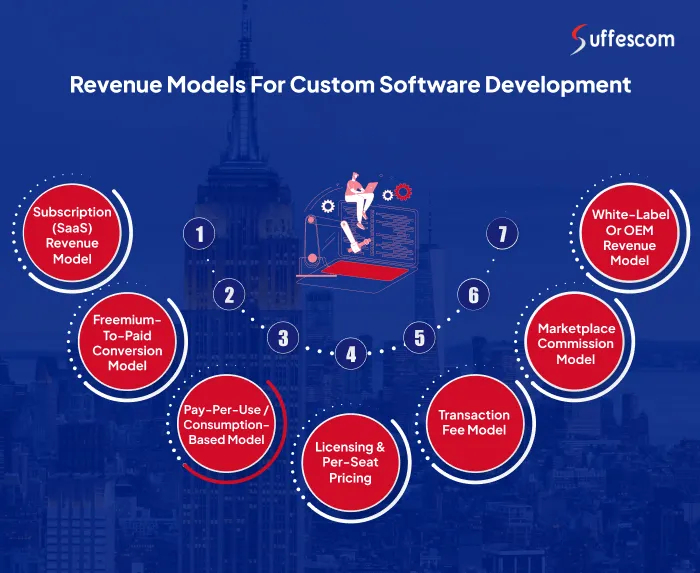
Here are some revenue models that you can use in your software solution:
1. Subscription (SaaS) Revenue Model
The highest adopted model in UK, where users pay a recurring fee for access. It ensures predictable cash flow and works best for SaaS platforms and analytics tools.
2. Freemium-to-Paid Conversion Model
Users get some features for free and pay to get premium features. This model boosts user acquisition and later converts them into paying customers through value-driven upgrades.
3. Pay-Per-Use / Consumption-Based Model
Billing is based on usage metrics. This type of revenue model is best for cloud tools and platforms where usage changes per customer.
4. Licensing & Per-Seat Pricing
Businesses pay a one-time or annual licence fee, based on the number of users. This model suits an enterprise software solution requiring controlled access.
5. Transaction Fee Model
The platform takes a percentage or a fixed fee from every transaction processed. Common in eCommerce and booking systems.
6. Marketplace Commission Model
A dual-sided marketplace charges commission from sellers or service providers. This model grows quickly as the user base expands.
7. White-Label or OEM Revenue Model
Software is built once and resold under different brand identities. This model works for software vendors looking to scale without linear development costs.
How to Choose the Right Software Development Company in UK
Selecting the best software development company in UK requires assessing technical capabilities and long-term alignment. The focus should be on finding one of the top software development companies whose expertise matches your project’s vision and growth plans.
Technical Fit
A suitable software development company like Suffescom demonstrates competence in the specific tech stack, architecture style, and engineering depth required for your software solution.
Portfolio Fit
A top software development company in UK should have successful past projects that reflect similar project complexity, industry alignment, and the software developers' ability to deliver comparable solutions.
Transparent Pricing Model
The custom software development company UK should offer clear cost breakdowns, predictable billing structures, and visibility into how engineering hours are allocated.
Process Maturity & Tooling
A clear and precise software development process, supported by modern tools, guarantees consistent output, decreases rework, and helps in meeting timelines.
Long-Term Partnership Capability
The team of software developers should be able to support future additions, scaling needs, and ongoing optimisation beyond the initial software solution launch.
Conclusion
Software development costs in UK 2026 differ based on complexity, tech stack, and a lot of other factors. Small MVPs cost less while enterprise-grade platforms with AI, automation, and multi-module architecture cost more. The key to accurate budgeting is to know the depth of the project at the beginning and match the scope with the necessary business results.
For most businesses, a realistic budget should account for the core build and ongoing maintenance. Planning these components ensures predictable spending and removes the risk of scope creep. With the right software development company and a well-structured roadmap, your solution can deliver strong long-term ROI and support scalable digital growth.
FAQs
Q1. What is the average cost of software development in the UK in 2026?
Ans. The average cost of software development in the UK is typically between £15,000 and £80,000, depending on complexity and scope.
Q2. Why is software development more expensive in London compared to other UK cities?
Ans. Software development is more expensive in London compared to other UK cities because developer salaries and operational costs are 15–30% higher in the capital.
Q3. How much does it cost to build a basic MVP in the UK?
Ans. It costs £17,000 to £34,000 to build a basic MVP in the UK, depending on the feature set and required backend work.
Q4. What is the hourly rate for software developers in the UK?
Ans. The hourly rate for software developers in the UK ranges from £50 to £120, with specialists reaching £50–£150 per hour.
Q5. How much does AI software development cost in the UK?
Ans. AI software development in the UK costs between £15,000 and £70,000+, depending on data volume, models, and automation depth.
Q6. How do UK agencies price software projects?
Ans. UK agencies price software projects using blended hourly rates, resulting in fixed-price or time-and-material quotes aligned with project requirements.
Q7. Does outsourcing software development reduce cost?
Ans. Yes, outsourcing software development reduces cost by 30–40% due to lower labour and operational expenses in nearshore/offshore markets.
Q8. How much do UK companies charge for app development?
Ans. UK companies charge £10,000 to £90,000 for app development based on platform count, UI complexity, and backend needs.
Q9. What is the cost of hiring a dedicated development team in the UK?
Ans. The cost of hiring a dedicated development team in the UK ranges from £15,000 to £50,000 per month, depending on team size and seniority.
Q10. How much should UK businesses budget for maintenance?
Ans. UK businesses should budget 10–20% of the initial development cost per year for maintenance and ongoing support.
Q11. How long does it take to build a custom software product in the UK?
Ans. It takes 3 to 9 months to build a typical custom software product in the UK, while enterprise systems may take 12 months or more.
Q12. What hidden costs should I expect in UK software development?
Ans. Hidden costs in UK software development include
- Cloud hosting
- API fees
- Compliance tasks
- QA automation
- Security reviews
Q13. How does AI impact development cost savings?
Ans. AI impacts development cost savings by reducing manual development and QA effort by 15–40%, though it introduces new infrastructure costs.
Q14. Should I choose a UK software development company or a nearshore/offshore team?
Ans. You should choose a UK software development company for compliance-heavy or time-sensitive projects, and a nearshore/offshore team for lower-cost, scalable builds.
Q15. What increases software development costs the most in the UK?
Ans. The factors that increase software development costs the most in the UK are:
- Complex architecture
- Multi-platform builds
- AI integration
- Accelerated timelines.
Q16. What is the best way to estimate software development cost accurately?
Ans. The best way to estimate software development cost accurately is to define the scope clearly and multiply the required engineering hours by the UK hourly rates.







